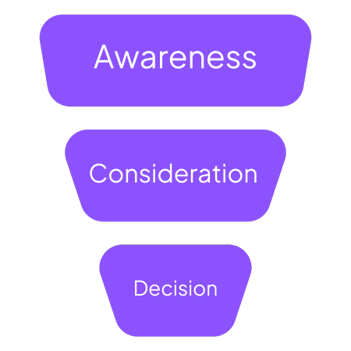In this comprehensive guide, we'll share actionable insights and strategies to enhance your content creation process, tailored specifically for each critical phase of the customer's purchasing journey.
Obsah
Importance of Personalising the Costumer Journey Content
What Content to Choose for each Stage of the Buyer's Journey
Introduction
As a business or organization owner, you've most likely already encountered content marketing. It's not just about simply describing your products or services. Content marketing is a powerful and widely used tool to get your message across to your target audience, foster trust and strengthen relationships, and ideally, persuade them to interact with your website or product.
Yet navigating the world of content marketing can often be daunting. You may be struggling with combining different forms of content - from blog posts, newsletters, e-books, case studies and white papers to webinars - and wondering about the appropriate placement. But the key questions are: What kind of content fits your organization's needs? What kind of content will resonate with your target audience and drive them to become customers?
If you examine the buyer's journey in detail - the process by which people learn about and gain trust in your brand - and determine the most beneficial content for each stage of that journey, you'll be better able to predict what types of content are needed.

Awareness Phase
In this initial phase, the potential buyer is faced with a problem or notices the signs of a problem and tries to understand and solve it. He or she is probably looking for different sources of information to better understand the problem and to be able to name it as accurately as possible.
Think about a typical search that a potential customer might initiate: "How can I increase sales?" During this phase, don't focus on the solution or the supplier just yet; that will come later. Their primary goal is to define and clarify their problem. Your goal as a content specialist is to show up for the keywords in search engines, demonstrate your expertise, and gain the trust of potential buyers right at the beginning of their journey.
Consideration Phase
At this stage, the buyer has not only identified but also named their problem. He or she is now engaged in exploring and understanding all possible strategies and methods to address the identified problem or opportunity. In essence, he or she is considering different solutions.
A typical search question at this stage might be, "What is more effective: expanding abroad or reaching more people in the existing market?" At this stage, the potential customer is not yet ready to buy; he is in the process of determining the best solution to his needs. Your goal here is to identify indirect competitors and provide the potential customer with information content on the advantages and disadvantages of each option.
Decision Phase
By the time the buyer reaches the decision stage, they have already selected their preferred strategy, method or approach to the solution. His goal at this stage is to create a list of potential suppliers, narrow it down to a shortlist and then decide who to buy from.
Typical searches that a potential customer might undertake in the decision phase might be as follows: "ExpandHelper vs ExpandAgency". At this stage, he is already ready for the investment and will most likely choose a provider that has gained his trust and favour, provided that the provider can meet his requirements.

Importance of Personalising the Customer Journey Content
In any type of marketing, a deep understanding of your audience is essential. This includes knowing their mindset, the information they're looking for, and their typical path to solving a problem. With this knowledge, you can create a content strategy that tailors your content to each stage of the buyer's journey.
A lack of understanding of your audience can lead to your business disengaging with potential customers. For content marketers, this often leads to creating content that doesn't resonate with your audience and risks losing their engagement.
To get around this problem, it's essential to understand what stage a given customer is in, figure out how to effectively engage them at that stage, and determine the most appropriate channels for content delivery. The advent of digital has simplified the process for marketers (and sales teams) to engage with customers at different stages of their journey through content marketing. For this reason, 60% of marketers consider content a "very important" or "extremely important" part of their overall strategy.
However, creating the right content for the right audience at the right time remains a challenge. However, our guide will walk you through the process in great depth.
What Content to Choose for Each Stage of the Buyer's Journey
When selecting content that matches your audience's intent, it's important to understand the following concept:
Awareness
At this stage of their journey, potential buyers are looking for credible and useful information to better understand their problems. They need to clearly define their problem before they start looking for a solution.
Content that comes across as a direct sales pitch is unlikely to resonate with your potential buyers. Even high-quality, conversion-focused content created by top content writing services can turn them off instead of attracting them. That's why the most effective types of content for this stage are those that help consumers articulate and understand their problems.
- Blog posts: These serve the dual purpose of not only educating your audience, but also supporting your SEO efforts. The ideal length of blog posts depends on a variety of factors, including your audience and topic. A minimum of 300 words is generally recommended. A competent content writing service will advise you at this stage on what topics are most appropriate and the appropriate length for your blog posts aimed at the customers you want to engage.
- Social media posts: Sharing facts, interesting snippets and educational content on social media can effectively raise awareness among customers looking for quick information.
- Webinars: With more than 244.4 million people in the U.S. being educated through online videos, according to Oberlo, webinars focused on your customers' potential problems are also a pretty big opportunity to reach your target audience.
Consideration
Your informative content successfully introduced buyers to their problems and led them to the next step: exploring solutions. At this stage, your job is to offer additional information focusing on your products or services and how they can address buyers' needs or help achieve their goals.
It's important to remember that while buyers may not be ready to buy yet, they are open to exploring and possibly trying different solutions. Therefore, your content strategy for the consideration phase should be primarily educational. This phase also presents an opportunity to differentiate your offering from that of your competitors.
- How-to videos: a Techsmith survey showed that 83% of people prefer videos for educational or instructional content. To engage and keep your audience's interest, consider engaging a video marketing specialist to create engaging, high-quality videos that are both informative and attractive.
- E-Books: These are excellent for understanding complex topics and offer a higher level of detail than typical blog posts. A reliable content marketing service can not only help you develop eBooks for this stage, but also ensure that they are full of quality information and that your audience shows the desired interest in them.
- Briefing documents and case studies: These are documents that are particularly effective for B2B clients, satisfying the need for detailed information while subtly presenting your brand as an industry leader. You can refer to your company as a solution provider, but it's crucial to avoid overt sales pitches.
- Product/Service Comparison Guides: These guides help potential customers determine the most appropriate solution for their needs. In addition to comparison guides, consider creating blog posts that detail the pros and cons of specific solutions you offer. This approach offers potential buyers valuable content, builds trust, and establishes your authority in the industry. If your audience prefers video content, enlisting the help of a video marketing expert can be a strategic step in creating comparison videos.
Decision
Your potential customers have now reached the last stage of their journey or sales funnel. Their arrival here indicates that your content strategy has been largely effective.
After you've guided them through understanding their problem and explored possible solutions, the next step is conversion. At this stage, your goal is to convince your audience that your solution is the best option.
This involves using content types and texts that address any lingering hesitations in their decision-making process. For this key stage, you can create the following content types:
- Case studies: Serve as a powerful tool to convince buyers who need further proof that your product is effective and represents the right solution to their problem.
- Free demos: Offering a free trial or demo can be risky, but often leads to high conversion rates. It allows potential customers to try your product or service for themselves. If they find that it meets their needs, a deal can be made quickly. However, there is also the possibility that it won't suit them, which will require additional effort from your sales team to achieve a conversion.
- Free consultations and estimates: Offering free consultations or estimates allows potential buyers to get a glimpse of your offering. It also allows for direct interaction, allowing you to assess whether your solution fits their budget, and presents an opportunity to close the sale.
Many other types of content and platforms can be used in the decision phase, such as emails, social media posts and PPC ads. The key is to choose the ones that match your audience's current stage, while also being the most preferred.
Conclusion
In conclusion, the most important thing for successful content marketing is to tailor content to the different stages of the buyer's journey. The awareness phase requires informative content to help identify and understand the customer's problems, while the consideration phase requires deep insight into potential solutions. In the decision phase, content that can persuade potential customers to become buyers becomes essential.
Flexibility is also essential, specifically in delivering content via email, social media or advertising, which is important to satisfy audience preferences.
In short, the success of content marketing lies in tailoring and catering to each buyer's unique journey. However, if you're not sure about content marketing, don't despair and take advantage of our free consultation where our content marketing experts will be happy to help.
FAQ
1. What is the buyer's journey and why is it important for content marketing?
The buyer's journey is the path people take when making a purchase decision. It's important for content marketing because tailoring content to each stage increases conversions.
2. What content is appropriate for the awareness stage?
For the awareness stage, use blog posts, social media, webinars, and educational videos to help people identify their problems.
3. What is effective in the consideration phase?
Use 'how to' videos, e-books and whitepapers in the consideration phase.
4. How to persuade buyers in the decision stage?
In the decision phase, use case studies, free trials, demos or consultations to turn potential customers into buyers.
5. Is there a one-size-fits-all content approach?
No, a successful strategy adapts to the audience's preferences and stage of their journey.